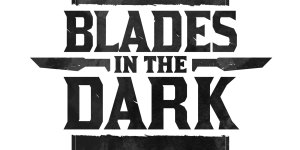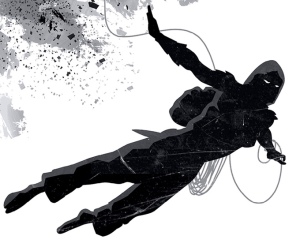Game Review: Blades In The Dark
 Blades in the Dark by John Harper is a tabletop games set in a fictional post-post-apocalypse, gaslight fantasy London-Venice-Prague mashup called Doskvol. The world essentially ended long ago with the destruction of the gates of death, land masses breaking apart to form the massive island nations of the Shattered Isles. No one has seen the sun clearly in ages. The dead never seem to find peace. The seas are a black ink full of horrors but the blood of those horrors is needed to power massive lightning barriers around cities that try to keep out the dead. The governments and their agencies are corrupt. More often than not, gangs and shadowy secret societies rule the streets. In all of this, you play as a crew of upstart scoundrels new to the scene of the criminal underworld.
Blades in the Dark by John Harper is a tabletop games set in a fictional post-post-apocalypse, gaslight fantasy London-Venice-Prague mashup called Doskvol. The world essentially ended long ago with the destruction of the gates of death, land masses breaking apart to form the massive island nations of the Shattered Isles. No one has seen the sun clearly in ages. The dead never seem to find peace. The seas are a black ink full of horrors but the blood of those horrors is needed to power massive lightning barriers around cities that try to keep out the dead. The governments and their agencies are corrupt. More often than not, gangs and shadowy secret societies rule the streets. In all of this, you play as a crew of upstart scoundrels new to the scene of the criminal underworld.
The setting of Blades is definitely an interesting one. A new normal has been established after the world as people knew it stopped existing. Technology and magic sit comfortably side by side, often needing each other to pull off the largest and most flashy of feats. Most importantly, I feel, is that you as a PC are not considered to be the hero in any capacity. Very few people within the setting could be considered heroes. Within the first paragraph of the manual, you are told that you are playing a scoundrel and part of a gang committing criminal acts. In a world of tabletop games in the heritage of Dungeons & Dragons that consistently frame you as heroes despite the fact that you rarely do more than leave death and destruction in your wake, Blades is refreshing. As a player, it also encourages you to explore some of the darker sides of humanity through its use of mechanics as they relate to fiction. And in Blades, fiction is king.
 Blades uses a d6-based pool system for rolling, based on skills and the situation. That may sound off-putting to someone who has dealt with games like Shadowrun and Vampire: the Masquerade with massive handfuls of dice to deal with what should be simple tasks. No one wants to slowly tally up 27d10s or 46d6s anymore. Blades is closer to a happy marriage between Burning Wheel and Apocalypse World: the acting player and GM work out what will fictionally happen then find the skills that best fit that. Other players can choose to help in the same way. You can gain more dice for your roll by, very literally, pushing yourself and getting stressed out or making a deal with the devil and taking a negative to gamble on a chance of doing better. You can attempt something even if the stats sheet says you have no idea what you’re doing or flashback to having planned for your current situation.
Blades uses a d6-based pool system for rolling, based on skills and the situation. That may sound off-putting to someone who has dealt with games like Shadowrun and Vampire: the Masquerade with massive handfuls of dice to deal with what should be simple tasks. No one wants to slowly tally up 27d10s or 46d6s anymore. Blades is closer to a happy marriage between Burning Wheel and Apocalypse World: the acting player and GM work out what will fictionally happen then find the skills that best fit that. Other players can choose to help in the same way. You can gain more dice for your roll by, very literally, pushing yourself and getting stressed out or making a deal with the devil and taking a negative to gamble on a chance of doing better. You can attempt something even if the stats sheet says you have no idea what you’re doing or flashback to having planned for your current situation.
Once the dirty deeds are done, your crew has a chance to take stock and deal with payouts, heat from the Bluecoats (the beat cops of the Blades universe) and other gangs, attempt to de-stress by indulging in your vices, and generally deal with a life of crime. Then you work together and decide what you want to do next and how, using the engagement roll to drop yourselves in media res to do it all again.
The mechanics are modular and progressive, moving smoothly from one to the next. Doing certain actions on the job leads to stress which can lead to either indulging in vices or not dealing with that stress and gaining traumas and complications which then can gain you experience to allow you to do more while on a job and more likely than not will cause stress. And so the cycle continues.
 From the other side of the screen, things are far less extensive than most games would demand of you. There are no dice to roll by default. A GM can choose to roll dice for decision making if they wish and that’s it. Even though there are times when it makes the most sense, like when choosing entanglements as the result of a score, you can instead just cherry pick from the listed table. The only thing that is absolutely demanded of the GM, aside from facilitating and guiding the game, is tracking factions within the world. If you’ve played or especially GMed Stars Without Number, you may have just recoiled at that. In Blades, this is much less arduous of a process and doesn’t involve spreadsheets unless you want it to. You don’t need to decide what’s happening with a gang until the players are or might end up interacting with them. For instance, a gang may have no ties to and never interact with the various consulates of countries. You don’t need to decide what high-powered political games they’ve been playing until the gang decides to kill, kidnap, steal from, or smuggle out a foreign dignitary. And trust me, kidnapping a foreign dignitary will probably be one of the less far fetched ideas you get from a crew.
From the other side of the screen, things are far less extensive than most games would demand of you. There are no dice to roll by default. A GM can choose to roll dice for decision making if they wish and that’s it. Even though there are times when it makes the most sense, like when choosing entanglements as the result of a score, you can instead just cherry pick from the listed table. The only thing that is absolutely demanded of the GM, aside from facilitating and guiding the game, is tracking factions within the world. If you’ve played or especially GMed Stars Without Number, you may have just recoiled at that. In Blades, this is much less arduous of a process and doesn’t involve spreadsheets unless you want it to. You don’t need to decide what’s happening with a gang until the players are or might end up interacting with them. For instance, a gang may have no ties to and never interact with the various consulates of countries. You don’t need to decide what high-powered political games they’ve been playing until the gang decides to kill, kidnap, steal from, or smuggle out a foreign dignitary. And trust me, kidnapping a foreign dignitary will probably be one of the less far fetched ideas you get from a crew.
Looking at just the mechanics of Blades, it sounds like it should be an endless grinding slog that burns through characters like paper a la Advanced D&D. In practice, it’s a very real feeling trek through the murky waters of criminality in an enclosed fictional setting where it’s hard for a PC to simply die and stay dead but easy to hyper-complicate their lives and make things interesting.
With how planning a score and the engagement rolls are set up, it takes a lot of the tedium and arguing out of a plan. You simply pick a type of plan, fill in the single detail for that type, the GM answers a few questions based on the fiction that fill out a dice pool that someone rolls. Based on that, you are dropped into the situation. Nothing more than that is needed to start.
Your characters can act towards their goals in pretty much any way they see fit and applicable. A Cutter (a character archetype all about dealing with problems physically and usually permanently), a Spider (the ever-plotting brains of the outfit), and a Whisper (your probably friendly gang occultist) can all deal with the same challenge in wildly different ways. Or the exact same way. Their chances of success may change but the choice is always there. That’s something that seems to come up constantly when playing Blades: there’s always a choice to move down one path or another.
Speaking of choice, one big one that was made in development of that game is that the focus would be on the characters and their interpersonal and tangential relationships. A large part of the game can be spent in the downtime phase, where PCs recover after missions, pursue their vices and personal goals, and maneuver themselves to set up for the next score. Alternately, your group might focus more on the action or find some other aspect of play that they latch on to. Here a few examples of actual play to give you an idea of how the game flows:
- The Bloodletters/Six Towers Gang (GM John Harper)
- RollPlay Blades (GM John Harper)
- It’s Never Sunny In Doskvol (GM Eric Vulgaris)
- The Firebirds (GMs Shaun/Hyena & Andrew)
- FriendlyFireTV’s The Gambit (GM Michael Yater)
- Encounter Roleplay (GM Finbar)
Since Blades was partly funded through Kickstarter, there are a lot of stretch goals that will be fulfilled over time. One of the first is an alternate setting for the base game, U’duasha. There’s also multiple hacks there were stretch goals. Harper himself will be penning a cyberpunk hack called Null Vector. There’s Stras Acimovic and John LeBoeuf-Little’s Scum and Villainy, for a mix of Star Wars-style rogues and Firefly/Serenity. Adam Koebel’s Womb of Night takes a more psychedelic metal approach with the Sword’s Warp Riders album as a touchstone. Sean Nittner chose to be a little more true to the source with Blades Against Darkness, where you play as vigilantes. One look at the Google+ community for the game will show you even more hacks of the game that have been in development since before its release. There’s Fallout-inspired Gamma World, a mashup of HGTV and Lovecraftian horror in Mortally Bankrupt, the American South crime drama of Copperhead County, and many more. A full list will be available on bladesinthedark.com when it launches.
This is definitely a game I would recommend picking up, even if you think your group might be put off by the idea of it at first. If you have a group that’s most interested in weaving a story together, this is definitely one to try pitching to them. You can buy the game via BackerKit or DriveThruRPG and take a look at the downloadable materials here. The digital version is available now with print version due out this spring.
Note: I am also one of those people writing a hack of Blades and John Harper is one of my backers on Patreon for it. However, he didn’t ask me to write this review. I just really love Blades and what it accomplishes with regards to gameplay, storytelling, and table dynamics. Consider this me spreading the word.
